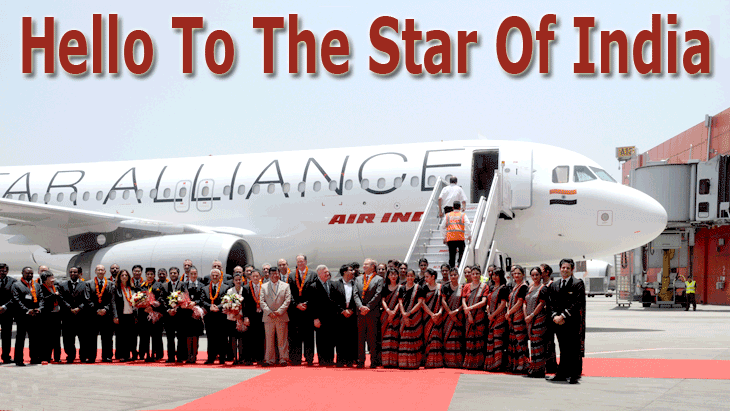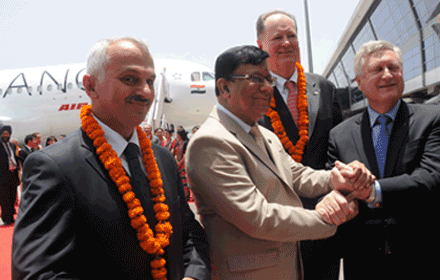| Hello To The Star
Of India

Air India CMD Rohit Nandan and CEOs from Star
Alliance member airlines at the unveiling of the Air India plane with
the Star Alliance livery at Delhi's Indira Gandhi International Airport.
Air India’s Maharaja
finally found his place in Star Alliance on July 11.
The membership has experienced some hiccups
on its four-year journey.
Now, the onus will be on Air India to prove
to the world that it is indeed a star—not only in providing facilities
to passengers, but also giving a leg up to cargo.
Armed with the Star membership, Air India
is looking forward to reviving its fortunes. The carrier had an operating
loss of $351 million and a net loss of $652 million in the financial year
that ended on March 31, 2014. But the good news from the airline is that
it will be able to bring down its operating losses by more than 42 percent
in 2014-15, thanks largely to the Star Alliance membership, which will
see more passengers and higher cargo volumes.

Star Alliance CEOs celebrate
as Air India joins Star Alliance. Left to right— Turkish Airlines
CEO Temel Kotil; Air India CMD Rohit Nandan; Austrian Airlines CEO
Jaan Albrecht and Star Alliance CEO Mark Schwab. |
Cargo
Belly Up
Air India Cargo, the cargo subsidiary of Air
India set up in 1954, stopped operations quite some time ago, but continues
to manage belly cargo of Air India’s passenger fleet.
Air India did away with its dedicated cargo
freighters.
Two years ago, Air India wrapped up its
cargo business and sold its six B737-200 freighters.
These planes belonged to Indian Airlines
(or Indian, which is now merged with Air India) and had been converted
to freighters when plans were drawn up to start cargo operations from
the Nagpur hub.
Later, in the face of worldwide recessionary
trends, the plans were disbanded.
Around that time, Air India officials said
that the sale of the freighters was due to the fact that they were “too
big for domestic operations and too small for international operations.”
Woe Is We
To add to Air India’s woes, the airline
lacked “a critical distribution network, warehousing facilities,
mismanagement, and inadequate infrastructure that had driven away business
from Air India's cargo division,” according to officials.
Over the last couple of years, however,
the carrier has been seeing “good business” in cargo.
According to sources in Air India, in the
last two financial years (2012-13 and 2013-14), the carrier had cargo
revenues totaling $140 million and $155 million, respectively.
Tonnage Up
In tonnage terms, 158,220 tons were carried in
FY 2013 in comparison to 137,000 tons in FY 2012. In
April-December 2013, for example, Air India carried 131,055 tons compared
with the 102,013 tons it carried during the same period of the previous
year.
Airline officials maintained that the ratio
of international and domestic cargo was 70:30. While international cargo
was seeing an upward movement on routes to Europe (London, Paris, and
Frankfurt), domestic cargo, too, was witnessing growth.
The other international markets where Air
India’s cargo was doing well were the Far East and the Gulf. Officials
maintained that the cargo division was concentrating on the US market.
Star Of India
With the Star membership, Air India has added
a total of 400 daily flights and more than 40 new destinations in India
to the Alliance network.
The Maharaja carries cargo on all these
routes and the management is keen to project Air India’s ‘star’
quality that officials believe will help cargo bring in 30 percent more
revenue in financial year 2014-15.
It is no wonder that Star Alliance’s
CEO Mark Schwab pointed out to FlyingTypers
that this (present) Air India is “a different Air India” where
the management was tough, had adjusted well to the merger (of Air India
and Indian Airlines) and had improved the fleet and services.
“All these qualities will take Air
India to a level where it would be able to provide consistently top quality
services on the ground and in the air and that would also include cargo.”
As Air India’s Commercial Director
Pankaj Srivastava pointed out:
“We were benchmarked against one of
the world’s top carriers and that kind of benchmarking is done periodically
by Online Customer Service Surveys (OCSS).” The survey clearly projected
AI as being inadequate—that is now being diligently followed across
all departments of the airline.
More
Good Words
As Chairman and Managing Director Rohit Nandan
put it:
“This [the Star Alliance membership]
is the opportunity and everybody in Air India now realizes that there
are not too many opportunities left and if we do not take these opportunities
seriously, then I think we are missing the bus.
“And I am very happy that the employees
have been reacting in a very positive way.”
Tirthankar Ghosh |






